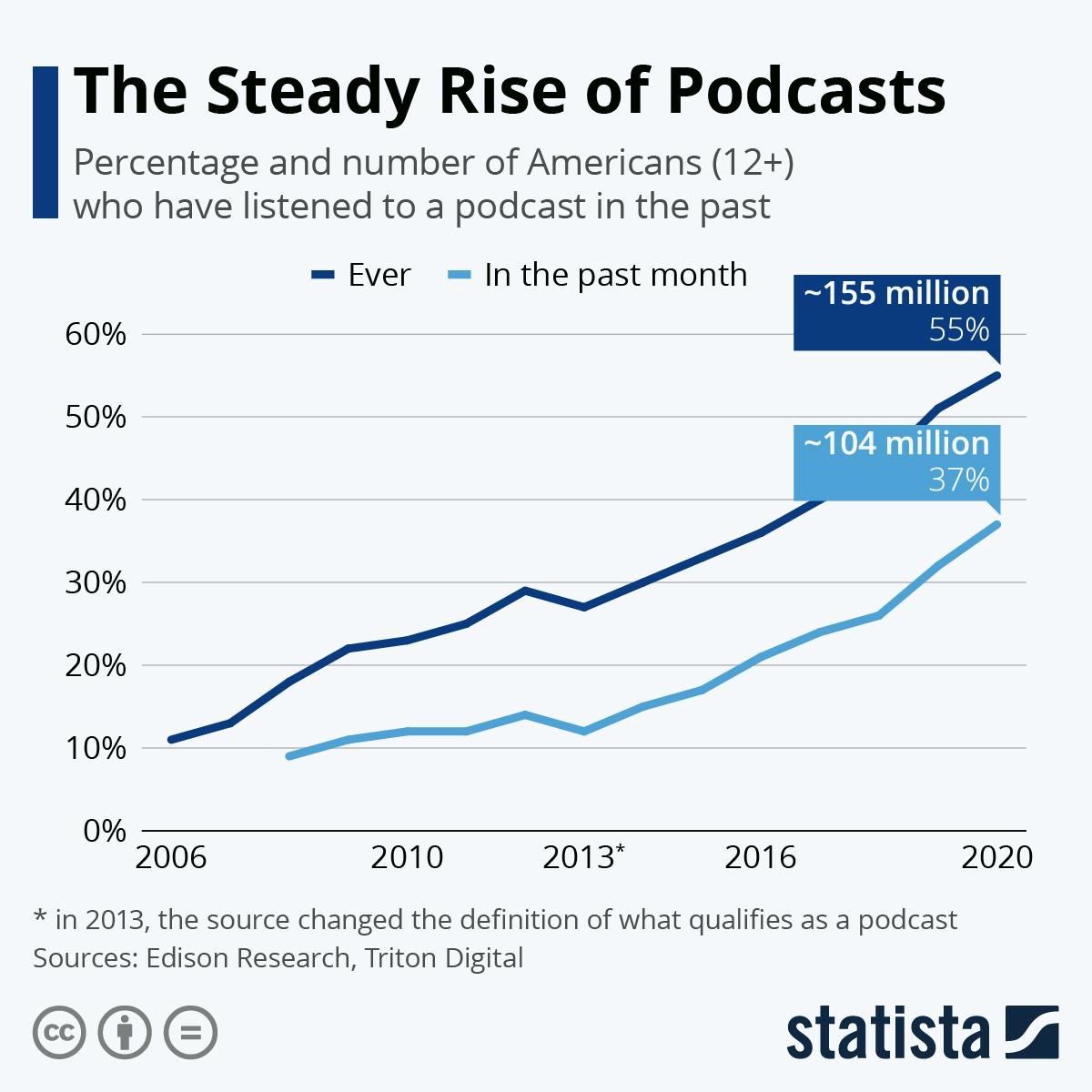How to launch a podcast
---
In this article, Abhijat Saraswat explains the benefits of podcasting for law firms.
The number of new podcasts created continues to increase, and podcasts are big business for good reason. Creating and publishing a podcast doesn't have to be complicated. In this article, I share the lessons I’ve learned since starting the Fringe Legal Podcast two years ago. In that time, I’ve recorded over 65 episodes under the brand.
Why should you create a podcast?
The popularity of audio-based content continues to rise: over half of Americans have listened to a podcast at some point, and this number is echoed across the world.

Source: Statista
Here are three top reasons why you should consider starting a podcast
Establish your expertise
You can leverage the podcast to present yourself as a thought leader. A podcast offers you with an opening to share your opinions and also connect with fellow experts.
A podcast allows an unprecedented opportunity to connect with prominent speakers, authors, and more that you will not be able to reach otherwise. Inviting these guests on your show provides them with a platform to speak and brings extremely valuable content to your listeners.
Additionally, through the podcast, you create an ever-growing repository of information that can be leveraged to attract clients or gain referrals.
Stand out from the competition
Although millions of podcasts are already available, most of them are unlikely to cover your specific area of practice or have your unique style.
Listening to a podcasts is a strangely intimate experience; most people listen to podcasts where they can be lost in the audio, and you have their attention for 10-45 minutes or more. Your subscribers will get to know you and share in your stories. Over time you can build a level of trust that is difficult to do across most other mediums.
It’s easier than it seems
Getting started with podcasting is much easier than it seems. There are many tools out there that allow you to get started with nothing more than your smartphone. As you become more comfortable with creating content then you can start exploring more sophisticated tools that provide much greater control and flexibility.
Getting started
Here are some tips to consider before you get started. Planning your podcast and content will have the biggest impact on the success of your podcast.
Decide on your audience and topic
Consider the topic of your podcast - it could be specific to your practice area or cover case law, etc. When getting started, focusing on a niche will make it easier.
Also, keep in might your listeners: are you creating something that you wish to share with your clients, or is this for fellow legal practitioners, or for the general public?
Decide on the format and frequency
Is this a show where it will be just you talking (a solo podcast)? Will you have a co-host that discusses the latest events or news? Or, are you planning on interviewing a guest for each episode?
I would advise against having a solo podcast. Creating something conversational, whether with a guest or co-host(s), will be easier to create and more entertaining to listen to.
Think about how frequently you wish to publish an episode. Will it be weekly, bi-weekly, or monthly? Stick to this frequency.
Before you begin, I would recommend recording a number of episodes ahead of time and queue them up. This will ease the pressure and also allow you to map a process to use for the future.
Keep it simple when starting
It’s easy to get carried away with researching microphones and other hardware, wanting to learn a lot of different software, learning about syndication, and more. When you’re getting started just keep things simple.
Focus on getting a good enough microphone that allows you to be heard clearly. You can get these for as little as $30.
Find a quiet place to record - somewhere that absorbs sound is perfect. This means avoid big empty rooms with lots of glass, these create a lot of background noise.
In order to publish a podcast, you need to have the audio track, name of your show, artwork, a hosting provider, and a way to syndicate it across different services (so it can be found on Apple, Google Podcasts, Spotify, etc.).
When you’re first getting started, you can make things extremely simple by leveraging something like Anchor.fm which does all of the above. There are some downsides but it’s suitable to get started.
Once you’re comfortable, to record audio you can use apps such as Zencastr, or Zoom. You don’t need anything fancy to edit the audio - using Garageband or Audacity is perfectly acceptable. And for publishing find a good host - I personally use Transistor.fm but there is also Soundcloud, Podbean, and many more.
My parting advice will be to create consistently and ensuring that your content offers value. Podcasting is a truly fantastic opportunity to build your brand, widen your network, and inform your audience. Should you have any questions as you get started please feel free to contact me.
Related links
Main menu






